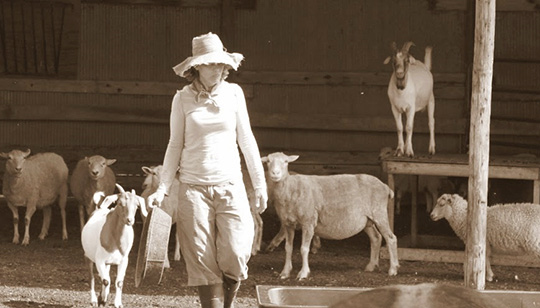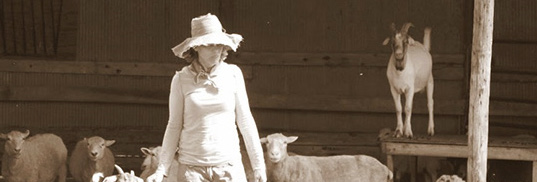After discovering letters in the Iowa Women’s Archives that made her realize she was not alone in her experiences, Janet Schlapkohl decided to tell her story. She wrote “Coming of Age in Chore Boots,” a one-woman play that traces her relationship with the family farm from her time as a child to a grown adult in the midst of, and after, the 1980’s farm crisis. Though the show tells her personal story, and that of her family, she was also telling the story of thousands of others as well. For many of her audience members, the confessional and vulnerable nature of her story resonates deeply with them because it breaks the silence that had existed for many years surrounding the subject of the 1980’s farm crisis. One of Janet’s goals is to educate people on this time period and bring some understanding to it, and she accomplishes this through an introductory video (see clip) shown before performances to give audiences a concise overview of the events. Many disappearing towns and many farmer suicides marked the 1980’s farm crisis, and “Chore Boots” personalizes this part of history with anecdotes about her neighbors and monologues about her experiences. In particular, Janet explores the secretive nature of the crisis, where nobody confided in each other. During one section about a relationship with a neighbor, Janet says, “She didn’t tell me then that the Ag Loan officer had been to their house so often that their dog no longer barked at him.” The breaking of the silence on the subject of this economic collapse is so profound that Schlapkohl has had numerous audience members come up to her after performances to thank her for telling their story and making them see that it was not their fault, and that they were not alone.
When asked about what inspired her to create this show, Janet said, “I wondered how many other women there were like me. Thought of my neighbors and family. Thought of all the people standing around at that sale. None of us had ever talked about it, so I thought well, I want to talk about it, it’s okay to talk about. I think it’s a great mea culpa moment for me to stand there and say what the auctioneer said…There’s a little bit of relief at that part—to be able to stand on stage and yell it, it’s therapeutic.”
Janet also expressed to Rootstalk her belief that it was important to her that she speaks up about her story because the crisis had such a widespread effect, saying: “It’s very important for non-Midwesterners [to learn about the farm crisis of the ‘80s]. It affected the national economy at the time. It’s important for them to see something that was a huge calamity in a huge portion of the country, this whole great central plains region - not just the Midwest was affected - it helps for people to realize how we’re connected.”
There is plenty to learn from the 1980’s farm crisis and its effects, Janet asserts. She suggests that there were ways the collapse of the industry could have been averted—through banks not pressuring farmers and through changing the national policies that caused problems in the first place—but also points out that the effects could have been minimized (in terms of suicides and deaths) if those struggling had only been more open about what they were going through. When asked what is the biggest lesson she would like people to take from “Chore Boots,” however, Janet says, “Pay attention to how national policies can impact the economy of thousands and thousands of people… The economic policies that caused the crisis to occur are still very much in place.”
An upcoming performance of “Coming of Age in Chore Boots” can be seen in West Union, Iowa at the West Union Performing Arts Center on May 14, 2016 at 7pm. Admission is $10 per ticket with proceeds donated to West Union’s New Community Theatre and Fayette County Historical Society.
More information about Janet Schlapkohl and her works can be found on her website.

Schlapkohl doing chores on her farm. To watch a video presentation on the effects of the farm crisis on farming families in Iowa, click the image above.


